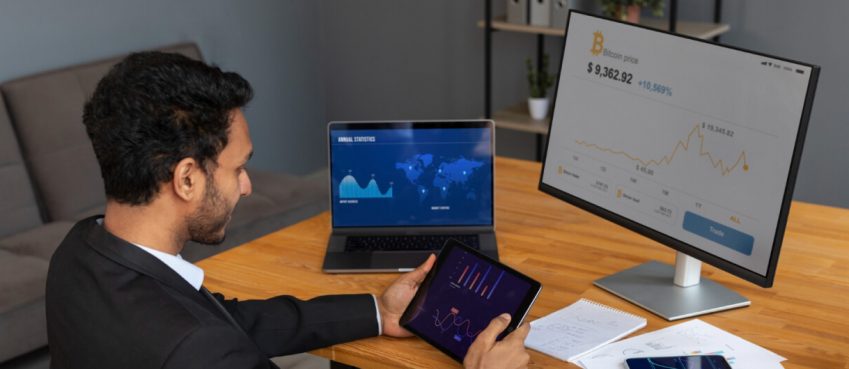
Blockchain technology is expected to increase the efficiency and security in procurement companies across all industries, while also adding value to their customers.
Are You Ready to Be Blockchain-Ready in Your Supply Chain?
One of the most well-known examples of blockchain potential is cryptocurrencies. This technology is attracting attention from outside finance.
The Blockchain Transforms Supply Chain Management
The core technology behind blockchain is the decentralized ledger. It records and protects transactions between multiple parties.
Cryptocurrencies are based on blockchains such as Bitcoin and Ethereum to enable anonymous parties to transact with each other without the need for intermediaries.
Supply chain management allows parties to transact directly with each other, increasing security and contract compliance as well as reducing costs. Supply chain blockchains “tokenize” a range of transaction-related information.
This allows for unique, easily verifiable identifiers like purchase orders, inventory units, and bills of lading.
Each transaction between stakeholders is tracked. Each phase of every transaction assigns each participant a unique digital signature. This audit trail cannot be altered. Bad actors will need to be able to modify links in any subsequent documents.
Also read: 10 Best Paid Online Survey Websites In The World
Businesses can reap the many benefits of blockchain technology
Blockchain technology improves efficiency
A supply network that uses blockchain technology to increase communication and collaboration between all parties depends on a common infrastructure. Transparency, traceability and elimination of duplicate orders are two benefits of blockchain technology.
Rogue spending and invoice fraud will not be tolerated. All parties can meet their obligations quickly, accurately, and completely by having contingencies for contract compliance.
Due to full visibility of financial performance, financial information and financial data, small businesses have more financing options and faster processing times.
Blockchain makes ethical sourcing more sustainable
With its traceability and tamper resistance, the blockchain makes it easier to track where goods and materials come from, how they travel along the supply chains, and who has access.
Blockchain technology offers greater savings
The efficiency gains and reductions in stock loss and waste are key sources of cost savings. Distributed networks can exchange resources and perform digital transactions. This eliminates the need for paper-based workflows and materials.
It not only lowers material costs but also reduces labor and storage costs to process and manage all the documents.
Also read: What Is DeepNude Undress AI Tool? A Complete Guide + Best Alternatives To AI Undress Apps
Additional Functionality to Other Digital Transformation Technologies.
Blockchain integrates other technologies such as process automation and IoT objects like intelligent sensors and RFID tags. This allows for greater efficiency, visibility and accuracy throughout the value chain.
Cloud Project’s Requirements to Success
There are a few factors that will decide if blockchain (the cloud), is appropriate for a project in the supply chain.
Data exchange
The Blockchain is a great candidate for data transfer between unrelated parties.
Trusted Partner
Because blockchain updates are made by multiple parties that are not related, it is crucial to be able to trust all of your partners.
Also read: 210+ Best Pick Up Lines: Funny, Cheesy, & Flirty Pickup Lines For Boys & Girls
Shared value
When the project has a high level of mutual benefit, all parties will be encouraged and supported to adopt the technology.
- Defined Data Standards:
All parties can use a consistent process that is well-defined. Data standards will ensure data accuracy. It should be a standard such as electronic data interchange (EDI).
- Integrated:
In order to get the most out of blockchain technology, you should integrate it with existing tech stacks such as an enterprise resource management system (ERP) or
Cost Versus Benefit Analysis
It’s important to take into account the capital and computational costs of blockchain. Different costs can be incurred when transactions are made via the cloud.
It all depends on how fast they need to be completed. These transactional costs often go unnoticed. This can impact the viability and sustainability of a project.
The elements you are looking for will not exist, making it unlikely that this project is worthwhile.
Also read: Top 10 IoT Mobile App Development Trends to Expect in 2021
Leading Organisations Already Use Blockchain’s Potential
Blockchain is still a new technology so companies may not want to use it. Blockchain’s capabilities have been used by many companies in their supply chain.
FedEx
has integrated the blockchain into its chain of custody in order to improve traceability, ensure a trustable record, and resolve customer disputes. FedEx is also a member of the Blockchain In Transport Alliance (BiTA).
DeBeers
DeBeers uses blockchain’s tracking technology to track the origin and progress of every natural diamond they mine. The Tracker app also addresses consumers’ concerns regarding ethical sourcing.
Also read: What Is Spotify Premium Duo? Explained (Pros & Cons)
Walmart
Walmart is seriously interested in blockchain technology and has begun piloting several programs using Hyperledger Fabric. The blockchain is used by Walmart to track the origins and sale of pork in China, among other things.
Blockchain is an important catalyst for economic transformation around the world. But, the currency is just the beginning. Blockchain technology has the potential to give you more control over your supply chain and provide greater visibility than ever.
Blockchain technology is the key to lower prices, greater efficiency and stronger positions in a competitive marketplace for businesses that are ready to embrace the new way of managing supply chains.
Top 10 News
-
01
[10 BEST] AI Influencer Generator Apps Trending Right Now
Monday March 17, 2025
-
02
The 10 Best Companies Providing Electric Fencing For Busines...
Tuesday March 11, 2025
-
03
Top 10 Social Security Fairness Act Benefits In 2025
Wednesday March 5, 2025
-
04
Top 10 AI Infrastructure Companies In The World
Tuesday February 11, 2025
-
05
What Are Top 10 Blood Thinners To Minimize Heart Disease?
Wednesday January 22, 2025
-
06
10 Top-Rated AI Hugging Video Generator (Turn Images Into Ki...
Monday December 23, 2024
-
07
10 Top-Rated Face Swap AI Tools (Swap Photo & Video Ins...
Friday December 20, 2024
-
08
10 Exciting iPhone 16 Features You Can Try Right Now
Tuesday November 19, 2024
-
09
10 Best Anatomy Apps For Physiologist Beginners
Tuesday November 12, 2024
-
10
Top 10 Websites And Apps Like Thumbtack
Tuesday November 5, 2024







